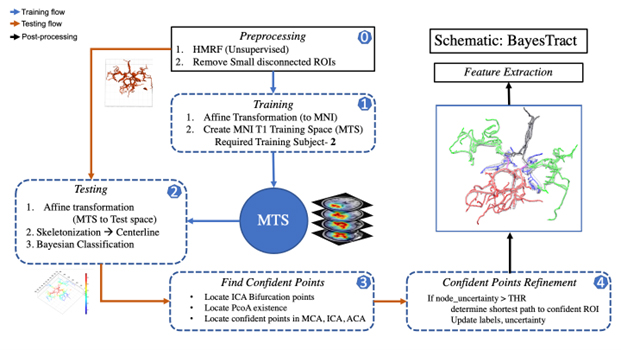Automated machine learning-based brain artery segmentation, and feature extraction on MR Angiography

Figure 2a: Schematic representation of our BayesTract pipeline
Cerebrovascular disease is a global health concern, impacting mortality and well-being. Time-of-flight magnetic resonance angiography (TOF-MRA) is a common noninvasive method to assess vascular abnormalities. However, manual vessel annotation is time-consuming, and existing machine learning-based approaches often rely on extensive training datasets.
In this project, we aim to develop an automated vessel segmentation and feature extraction pipeline using machine learning and super-resolution techniques, validated with in-vivo MRI scans. The study explores the associations between vascular features, cerebral small vessel disease markers, and cognitive performance in an existing dataset (101 HIV+ and 102 HIV- controls with CSVD). Our hypothesis is that this approach will provide more accurate and time-efficient measures, contributing to the advancement of brain vessel segmentation and feature extraction. The results could facilitate the translation of vessel-related biomarkers into clinical practice, benefiting diagnostic studies and enhancing patient outcomes.

Figure 2b: iCafe features obtained from a 57 years old female HIV+ patient. MIP map from 3D MRA, traced MIP and 3D vasculature using iCafe. Arteries are shown in different colors; automated MRA segmentation.